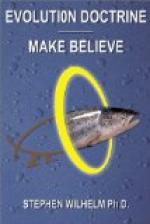Every one can find something worth while in the lessons of evolution, summarized in the foregoing statements. The atheist, who declines to personify the ultimate powers of the universe, may, nevertheless, find direction for his life in the principles brought to light by science. The agnostic, who doubts the validity of many conventional dicta that may not seem well grounded, can also find something to believe and to obey. Finally, the orthodox theist of whatever creed may discover cogent reasons for many of his beliefs like the Golden Rule previously accepted through convention; and he must surely welcome the fuller knowledge of their sound basis in the materials and results of comparative analytical study. To every one, then, science and evolution offer valuable principles of life, but great as their service has been, their tasks are not yet completed, and cannot be completed until the end of all knowledge and of time.
INDEX
Achatinellidae, 103, 104.
Activities, instinctive and reflex, 203, 205, 208;
of familiar animals, 208, 209;
differ from instinct, 209, 210.
Adaptation, universal relation to environment, 15;
principle of, 17;
degenerate forms enlarge our conception
of, 50;
results of larval short cuts in development,
71; 109, 213.
Africa, fauna of, 103, 164, 165.
Agassiz, a believer in special creation, 98.
Ages, Palaeozoic, 92;
Mesozoic or Secondary, 93, 94;
Cenozoic or Tertiary, 93;
Coal or Carboniferous, 94.
Albumen, of egg, 60.
Alligators, a diverging branch of lizard, 45.
Amoeba, 21, 51, 69;
comparative study of, 203, 205, 231, 247,
251, 254, 257, 258, 259, 265,
266.
Amphibia, frogs, salamanders, a lower class, 45, 62;
order of evolution of, 63;
evolved from fishes, 64;
most primitive backboned animals, 92;
94, 157;
embryos of, 171; 200.
Anatomy, of mind, 202.
Ant-bears, 42.
Anthropoidea, 160.
Anthropology, 177;
methods and results of, 186;
types of, 186, 187;
comparative, of mind, 211.
Anthropometry, 177.
Ants, communities of, 125;
mental life of, 207, 208;
organizations of, 260, 263, 264.
Apes, 158;
susceptible to training, 210;
line from Amoeba, 231.
Appendix, vermiform, 168.
Apteryx, wingless bird of New Zealand, 44, 200.
Arachnida, 49.
Archaeopteryx, a famous “link,” 99.
Ares, 300.
Armadillo, 42.
“Arts of life,” 226-230;
dwellings of men, utensils, 227;
history of clothing, 228;
arts of pleasure, 228-230.
Atom, carbon, 22;
nitrogen, 23;
hydrogen, oxygen, 24;
chemical, 25.
Atua, 301.
Azores, animals of, 103.




